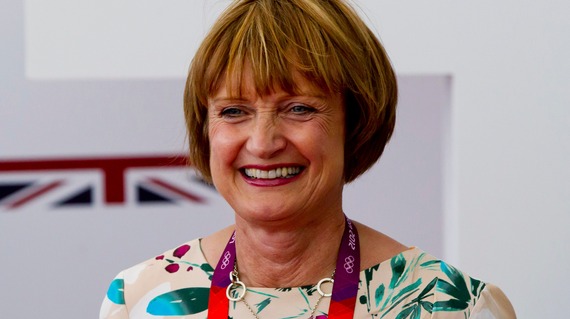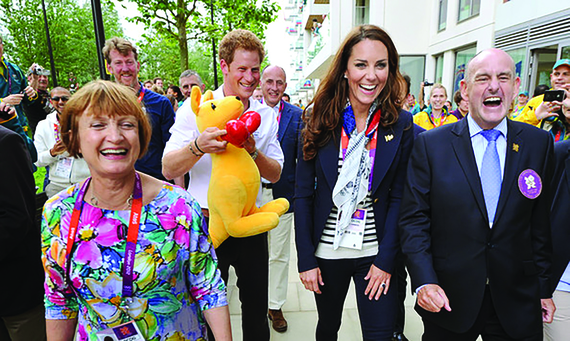
By Pippa Lamb, Harvard Business School, Class of 2018 & Editor-in-Chief atThe Harbus
At the end of President Trump's first week in the White House,
Editor-in-Chief Pippa Lamb caught up with the Baroness Tessa Jowell of Brixton DBE, former Olympics Minister, Culture Secretary, and cabinet minister under the Blair and Brown governments, to discuss the changing relationship between business and politics.
For British Harvard Business School students attending classes last semester, there was a familiar face on campus, as the Baroness Tessa Jowell of Brixton DBE, a former cabinet minister under both the Blair and Brown governments sat in on several first-year MBA classes. Appointed a Menschel Senior Leadership Fellow at the Harvard T.H. Chan School of Public Health and Professor of Health Policy and Political Analysis last year, Jowell took time out of her busy teaching schedule to visit HBS, and experience the case study method of teaching in classes including Marketing, Leadership, and Financial Reporting and Control.
With several Harvard Business School alumni joining the White House, and economics-driven political movements arguably leading to Brexit and the election of Donald Trump, one might say the relationship between business and politics is more convoluted than ever. What does this mean for future collaborations between the public and private sectors? And are Harvard Business School students now considered equally qualified for a career in public office, as their contemporaries from the schools of law or public policy?
For Jowell, it all comes down to trust. "The relationship between business and politics has changed, but it's been coming for some years, particularly now in the wake of collapsing faith in politicians and the growth of post-truth. There's a sense that people are looking for somebody to trust."
Yet in a world of Orwellian rhetoric, scrutiny of mainstream media outlets, and claims the public "has had enough of experts," who does the public trust?
Jowell sees the private sector as a prime beneficiary: "It's interesting that if you look at last year's Edelman Trust Barometer, CEOs were regarded as the most trusted to tell the truth and be believable." The trend appears to have continued this year, with the latest version of the report published last week showing "business" with the largest increase in perceived "trust" among both the informed public and general population.
"Trump and Brexit are a symptom of the changing relationship between politics and business. They're not the cause."
Jowell is also quick to point out that this issue of "trust" extends not only to individuals, but to organizations themselves. "There is a growing expectation that businesses will behave well", pointing toward measures such as low to top earnings ratio for salaries, stringent standards on equal gender pay, and environmentally sustainable operations. Businesses that fail to comply with such social trends in the next five years will, in Jowell's mind, "quickly fall behind". "Just as young people going for their first job want to be proud of the company they work for, so too do consumers now want to be assured that they are giving their business to an ethical company."
But do recent political events on both sides of the Atlantic mark a turning point in the muddying relationship between business and politics? Jowell doesn't think so. "It's been coming for a long time. The election of Donald Trump and the Brexit vote are the result of this trend. They're not the cause of it".
While at Harvard Business School, Jowell had the surprising experience of discovering she was a protagonist in one of the HBS case studies, having played a pivotal role in the London 2012 Olympics. Struck by the narrow lens through which students were asked to analyze London 2012's ticket pricing strategy, Jowell addressed Section G at the end of class, receiving a standing section ovation for her candid comments, which stressed that the case only told "part of the story", and that in reality, it is critical to distinguish between the business goals set in the public and private sectors. "Every major project is likely now to have both a public investment element and a commercial element", Jowell added. "The two should be mutually reinforcing."
Distinguishing between business plans for the public and private sectors in HBS Case Studies
As a former Olympics Minister and member of the Organizing Committee alongside Lord Coe and Jeremy Hunt, Jowell is well positioned to speak about public-private partnerships - the Games were themselves a mammoth $15 billion public project. "The biggest lesson I learnt came when G4s [the private security firm contracted by the British government] failed to deliver the security staff that they had been contracted to do two weeks before the games". Jowell recalls, "It came as a shock, and led to a few days of crisis".
"I think that the lesson from that is that given the size of the contract and the importance of what they were delivering, there really should have been a civil service team embedded in the company to represent the public interest". Jowell adds, "It goes both ways. If a public body takes on a large private contract, it's also reasonable to suggest the contractor should have a dedicated team working on its behalf to ensure the objectives of the private company are met in practice."
It is serendipitous therefore that Harvard chose this year to teach students a case study on the ticketing strategy behind the London 2012 games.
"I so enjoyed the class, but what struck me was that it only gave a very partial account of what happened". Pointing out the critical need to distinguish between private and public considerations, Jowell added, "It treated 2012's business plan as if it were like any other company. In fact, this was a business plan specifically designed to achieve one of the great objectives of the Olympic games, which was to maximize participation from spectators all across the country."
The path ultimately chosen by the London Olympics committee was a successful one. Of the 8.8 million tickets issued, 75% were sold to the public or distributed via inclusion initiatives, including one that set aside 125,000 tickets for schoolchildren on the condition they achieved a set goal to earn them. To try and prevent accusations of exploitative pricing from the notoriously tricky British press, the committee opted to "have a little fun", and set the price range from £20.12 to £2,012, though the majority cost less than a hundred pounds.
Advice to MBA students considering a career in politics
So, what would Jowell say to Harvard students looking to go into politics one day? She certainly believes that time spent in the MBA classroom is an asset in today's world. "It is so important to understand why some business are successful, why some fail, to understand different models of leadership, and to understand pressures of very small businesses." That said, Jowell also points out that proclaimed business success does not substitute the need for working hard to build a solid track record in the local community - herself a former social worker. "Make sure that you take every opportunity, and make additional opportunities, to be involved in community action." For Jowell, this is what sets apart the politicians from the CEOs. "You must never lose the ability to connect big strategy with the lived lives of people in communities. And that matters whether you're running a successful business, or whether you are a senior minister in government."
Pippa Lamb (HBS '18) worked for the British government on China/UK relations in Beijing and Shanghai, before transitioning into finance, spending time in London and Hong Kong. Hailing from the UK, Pippa is a Fulbright Scholar under the British Friends of Harvard Business School Program.
For more articles published by The Harbus, please visit www.harbus.org.


